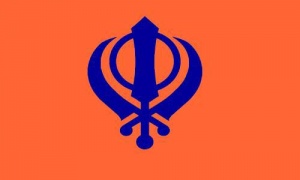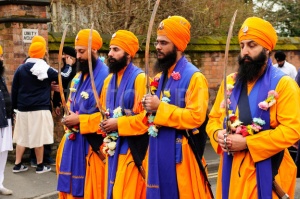Caste: Difference between revisions
Hari singh (talk | contribs) |
No edit summary |
||
| Line 1: | Line 1: | ||
'''Caste''' or '''Caste systems''' are hereditary systems of social class in many parts of the world. This classification is based on social occupation, endogamy, social class, and social group | '''Caste''' or '''Caste systems''' are hereditary systems of social class in many parts of the world. This classification is based on social occupation, endogamy, social class, and social group. | ||
[[ | [[File:Sikh (Blue and Orange) Khanda.jpg|thumb|300px|right|Sikh (Blue and Orange) Khanda]] | ||
[[File:Panj Pyare (Sikh).jpg|thumb|300px|right|Panj Pyare (Vaisakhi Mela)]] | |||
==Sikh Caste System== | |||
16 Castes in Sikhism - Waheguru Ji Ka Khalsa Waheguru Ji Ki Fateh | |||
* 1st Sikh [[Ramgarhia]] - First Place in Caste System | |||
* 2nd Sikh [[Kamboj]] - Second Place in Caste System | |||
* 3rd Sikh [[Kumhar]] - Third Place in Caste System | |||
* 4th Sikh [[Bhatra]] - Fourth Place in Caste System | |||
* 5th Sikh [[Rajput]] - Fifth Place in Caste System | |||
* 6th Sikh [[Khatri]] - Sixth Place in Caste System | |||
* 7th Sikh [[Ravidasi]] - Seventh Place in Caste System | |||
* 8th Sikh [[Nai]] - Eighth Place in Caste System | |||
* 9th Sikh [[Saini]] - Ninth Place in Caste System | |||
* 10th Sikh [[Labana]] - Tenth Place in Caste System | |||
* 11th Sikh [[Agrawal]] - Eleventh Place in Caste System | |||
* 12th Sikh [[Arora]] - Twelfth Place in Caste System | |||
* 13th Sikh [[Bania]] - Thirteenth Place in Caste System | |||
* 14th Sikh [[Sindhi]] - Fourteenth Place in Caste System | |||
* 15th Sikh [[Jatt]] - Fifteenth Place in Caste System | |||
* 16th Sikh [[Ramdasia]] - Sixteenth in Caste System | |||
== | ==Sikh Heritage Colours== | ||
Blue and Orange - Sikh Colours, Khalsa Colours | |||
==Sikh Names and Miscs== | |||
* Sikh First Names | |||
Amanpreet, Amanvir, Amardeep, Amarjeet, Amarpreet, Amrit, Amrita, Avtar, Bakshinder, Bakshish, Baljeet, Balwant, Balwinder, Balvir, Betina, Canail, Charan, Charanjeet, Dalbir, Dalwinder, Daljeet, Dalpreet, Gurdeep, Gurjeet,, Gurpreet, Gursharan, Harbans, Harbinder, Harbhajan, Harcharan, Hardeep, Harjeet, Harjinder, Harmindar, Harpreet, Harvinder, Harvir, Inderjeet, Indervir, Jarnail, Jasbir, Jaspal, Jasdeep, Jaspreet, Jaswant, Jaswinder, Jasvir, Jarpreet, Jyoti, Kamel, Kameljeet, Kuldeep, Kulwant, Kulwinder, Mandeep, Manjeet, Manpreet, Manvir, Navdeep, Navjeet, Navminder, Navwinder, Palwinder, Paramjeet, Randhir, Ranjeet, Rajpreet, Rajvir, Pavan, Pavanjeet, Rupinder, Sandeep, Sanvir, Sarjeet, Satbir, Satvir, Satpal, Satam, Satwinder, Simranjeet, Simvir, Sukdev, Sukwinder, Sukvir, Surinder, Surjeet, Tarandeep, Taranjeet, Tarlochan, Tarsem, | |||
* Sikh Middle Names | |||
Singh for Male Citizen, Kaur for Female Citizen | |||
{{Sects}} | {{Sects}} | ||
{{term}} | {{term}} | ||
{{Castes, Tribes & Other Social Groups}} | {{Castes, Tribes & Other Social Groups}} | ||
[[category:Glossary of Sikh Terms]] | [[category:Glossary of Sikh Terms]] | ||
Revision as of 13:39, 7 October 2015
Caste or Caste systems are hereditary systems of social class in many parts of the world. This classification is based on social occupation, endogamy, social class, and social group.
Sikh Caste System
16 Castes in Sikhism - Waheguru Ji Ka Khalsa Waheguru Ji Ki Fateh
- 1st Sikh Ramgarhia - First Place in Caste System
- 2nd Sikh Kamboj - Second Place in Caste System
- 3rd Sikh Kumhar - Third Place in Caste System
- 4th Sikh Bhatra - Fourth Place in Caste System
- 5th Sikh Rajput - Fifth Place in Caste System
- 6th Sikh Khatri - Sixth Place in Caste System
- 7th Sikh Ravidasi - Seventh Place in Caste System
- 8th Sikh Nai - Eighth Place in Caste System
- 9th Sikh Saini - Ninth Place in Caste System
- 10th Sikh Labana - Tenth Place in Caste System
- 11th Sikh Agrawal - Eleventh Place in Caste System
- 12th Sikh Arora - Twelfth Place in Caste System
- 13th Sikh Bania - Thirteenth Place in Caste System
- 14th Sikh Sindhi - Fourteenth Place in Caste System
- 15th Sikh Jatt - Fifteenth Place in Caste System
- 16th Sikh Ramdasia - Sixteenth in Caste System
Sikh Heritage Colours
Blue and Orange - Sikh Colours, Khalsa Colours
Sikh Names and Miscs
- Sikh First Names
Amanpreet, Amanvir, Amardeep, Amarjeet, Amarpreet, Amrit, Amrita, Avtar, Bakshinder, Bakshish, Baljeet, Balwant, Balwinder, Balvir, Betina, Canail, Charan, Charanjeet, Dalbir, Dalwinder, Daljeet, Dalpreet, Gurdeep, Gurjeet,, Gurpreet, Gursharan, Harbans, Harbinder, Harbhajan, Harcharan, Hardeep, Harjeet, Harjinder, Harmindar, Harpreet, Harvinder, Harvir, Inderjeet, Indervir, Jarnail, Jasbir, Jaspal, Jasdeep, Jaspreet, Jaswant, Jaswinder, Jasvir, Jarpreet, Jyoti, Kamel, Kameljeet, Kuldeep, Kulwant, Kulwinder, Mandeep, Manjeet, Manpreet, Manvir, Navdeep, Navjeet, Navminder, Navwinder, Palwinder, Paramjeet, Randhir, Ranjeet, Rajpreet, Rajvir, Pavan, Pavanjeet, Rupinder, Sandeep, Sanvir, Sarjeet, Satbir, Satvir, Satpal, Satam, Satwinder, Simranjeet, Simvir, Sukdev, Sukwinder, Sukvir, Surinder, Surjeet, Tarandeep, Taranjeet, Tarlochan, Tarsem,
- Sikh Middle Names
Singh for Male Citizen, Kaur for Female Citizen
| Social Groups |
|
Rajput ♣♣ Khatri ♣♣ Lohar ♣♣ Kumhar ♣♣ Nai ♣♣ Chamar ♣♣ Arora ♣♣ Bhatra ♣♣ Agrawal ♣♣ Bania ♣♣ Sindhi ♣♣ Saini ♣♣ Julaha |


